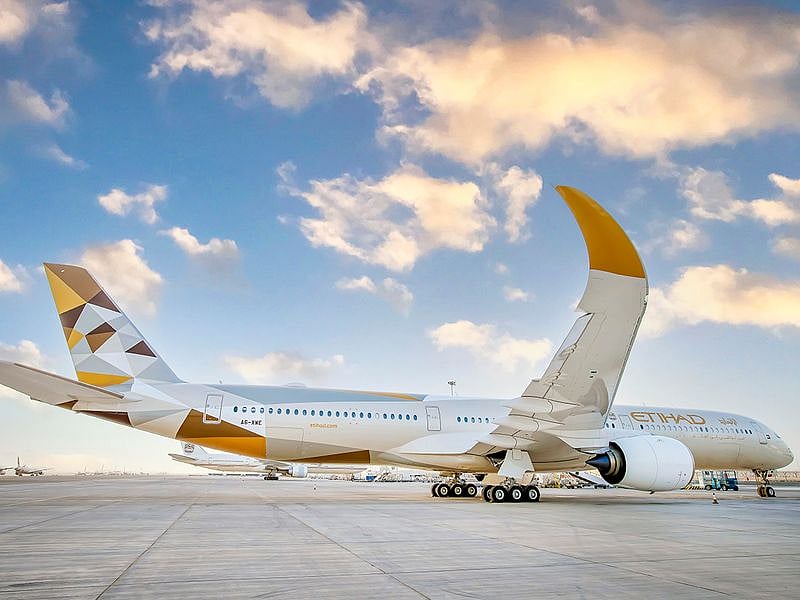Etihad Airways orders 32 Airbus jets, aims for 200 aircraft by 2030
Etihad raises aircraft fleet target to 200 jets, passenger target to 37 million

Dubai: Etihad Airways has confirmed an order for 32 new Airbus aircraft, including freighters, marking a major expansion of its wide-body fleet, airline CEO Antonoaldo Neves revealed to Gulf News.
Alongside this order, Etihad has increased its aircraft fleet target from a previous 170 planes to 200 jets by 2030, indicating a phase of rapid growth. This fleet expansion supports Etihad’s plan to boost passenger capacity to 37 million by 2030, up from 30 million passengers previously projected.
The airline's latest order comprises a firm order for six A330-900s, becoming the latest A330neo customer.
In addition, the airline has disclosed an order for seven additional A350-1000s (increasing its total for the type to 27) and three A350F (bringing the airline’s A350F commitment to 10 aircraft). First deliveries are expected in the beginning in 2027.
What about engine orders?
Commenting on engine orders, Neves said, “There are some engines coming with that. What we’re working on now is engine contract; not on buying the engines.”
Aircraft engine-maker Rolls-Royce confirmed that the aircraft will be powered by Trent 7000 and Trent XWB-97 engines. The 15 Airbus A330 Neo will be powered by the Trent 7000; seven Airbus A350-1000 powered by the Trent XWB-97; and 10 Airbus A350F freighter variants also powered by the Trent XWB-97.
Rob Watson, President, Civil Aerospace at Rolls-Royce, said, "We’re excited to continue our long-term partnership with Etihad, driven by confidence in the Trent XWB-97, where our investment will double time on wing in Middle East environments from 2028.”
Not happy with delivery delays
The UAE’s national airline took delivery of its first Airbus A321LR (long range) in July this year, fitting it with Etihad’s signature business class suites into a narrow-body aircraft.
While Neves said the airline is pleased with the aircraft performance, they remain “really not happy” with the delays, especially in 2027 and 2028. Still, the CEO remains steadfast in his ambition to grow Etihad’s fleet by any means necessary.
“We have some delays. We have some buffers in our plan. We just got informed about delays in 2027, 2028. It’s a joke. We’re not happy with that,” he said, adding, “It is improving. We had to get our A350s that were supposed to arrive in January – February. Those will be delivered in December. It’s not all bad news… But, I’m not happy.”
Neves also said he fears the supply chain challenges plaguing the industry may “last forever as the number of suppliers it has is very limited. There’s very little competition and when you don’t have competition, you have to accommodate,” Neves stated.
The aviation veteran insisted that if he had to option to buy aircraft from a supplier who does not delay, he would “definitely buy it.” He added, “I don’t have an alternative. I don’t think it will improve. I have no hope. And aviation in the region is going to keep growing.”
New targets
Etihad has also increased its aircraft fleet target from a previous 170 planes to 200 jets by 2030, indicating a phase of rapid growth. This fleet expansion supports Etihad’s plan to boost passenger capacity to 37 million by 2030, up from 30 million passengers previously projected.
The CEO shared that this reflects an expected compound annual growth of around 15-20 per cent, with next year alone forecasted at 18-19 per cent.
Network Links
GN StoreDownload our app
© Al Nisr Publishing LLC 2026. All rights reserved.